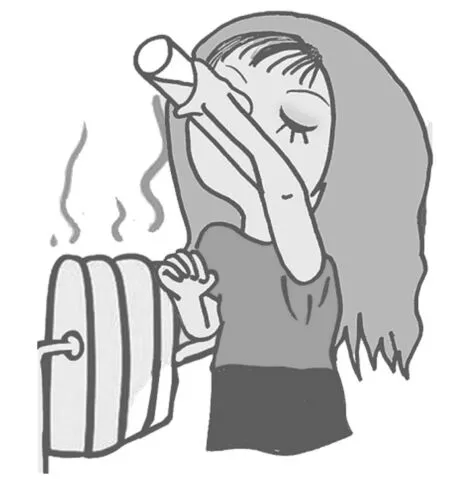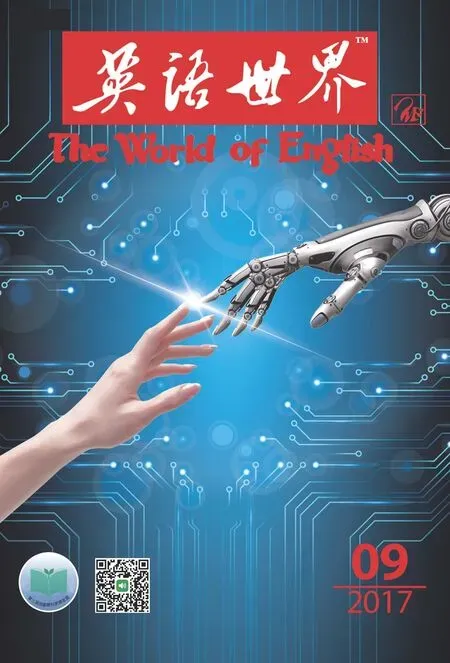China’s Go-to Beverage中国最受欢迎的饮品
文/妮科尔·刘 译/孙亚冲
By Nicole Liu
对很多西方人来说,喝白开水是很奇怪的。但大部分中国人(包括其他一些国家的人)也会觉得美国人喝冰水的习惯很奇怪,甚至有损健康。
[2]出身中医家庭,我自己就特别喜欢喝热水。
我早晨起来第一件事就是喝热水,一喝就是一整天。甚至在夏天也是如此。在我出生的大家庭里,没人敢喝哪怕是常温的水——因为这样做会遭到来自父母、婶娘、兄弟姐妹以及爷爷奶奶一连串的呵责,他们几乎会异口同声地说:“喝凉水会肚子疼!”
[3]有人认为这种喝热水的习惯可以追溯到1949年中华人民共和国成立初期,那时自来水水质比较差。
[4]“我记得小时候政府经常鼓励我们喝白开水。”68岁的李振辉(音)说道。他是我最近在电影院认识的,当时他坐在那里一边看电影一边喝热水。“当时,每个单位跟社区都有开水房,会有人挨家挨户地送热水。早晨一大早他们就过来,给你放在门口的瓶子里装满水。他们还会经常说,喝热水不仅对身体好而且很卫生。”
For many Westerners, the idea of drinking plain hot water is odd.But most Chinese (among others) think Americans’ habit of chugging ice water is equally bizarre, and even unhealthy.
[2] As the daughter of a traditional Chinese doctor, I am a devoted hot water drinker.
I drink it the first thing in the morning, and throughout the day. Even in the summer. I cannot live without it. In the big family I was brought up in, no one would dare to pour even room temperature water—doing so would risk a chorus of criticism, with parents, aunts, cousins and grandparents chastising you almost simultaneously:“Cold water gives you cramps!”
[3] Some people trace the hot-water habit to the founding of Communist China in 1949, when tap water quality wasn’t high.
[4] “I remember the government promoted drinking boiled water a lot when I was a child,” said Li Zhenhui,68, whom I met recently at a movie theater, where he was sipping hot water while watching a film. “There were boiler rooms in every [workplace] and community, and people delivered hot water to each household. They would do it very early in the morning by fi lling the containers you left outside the door.They kept saying it was for our health and hygiene.”
[5] Under the precepts of Chinese medicine, balance is key, and hot or warm water is considered essential to balance cold and humidity; in addition, it is believed to promote blood circulation and toxin release.
[6] When I tried explaining this to my husband’s friends while on a trip to his ancestral homeland of South Africa,I was met with blank stares. But in fact,my husband has become a hot-water convert too.
[7] In 2013, while on a road trip from Scotland to England, I endured cold water for four days as we drove through the foggy countryside. On the fi fth day,my Chinese stomach could take it no longer, and I begged my husband to stop somewhere to have a proper glass of steaming hot water. My husband, a Brit who has been in Beijing for over fi ve years, readily agreed.
[5]从中医的角度来讲,平衡很重要,热水和温水都有助于平衡人体内的寒气和湿气;此外,热水和温水还有助于人体内的血液循环和排毒。
[6]有一次去我老公的南非老家旅行,途中我把这些话讲给他的朋友们听时,他们听得目瞪口呆。不过,事实上我老公也已经养成喝热水的习惯了。
[7] 2013年,我们有一次从苏格兰到英格兰自驾游。当时我们开车穿过雾气茫茫的乡下,一连喝了四天的冷水,到了第五天我的胃实在撑不住了, 就央求着老公停下来,找个地方弄点热水喝喝。老公欣然同意了,他虽然是个英国人,可在北京已经待了五年多。
[8]我们最后找了家当地的咖啡店,环境还不错,接待我们的女服务员也很热情。我心想还是要杯茶吧,省得要热水还得解释半天。当然,茶包不过是要杯热水的幌子罢了。
[8] We ended up in a lovely local cafe and were received by a friendly waitress. I figured we should order tea rather than trying to explain our request.Of course, the teabag would just be a ruse to get a plain cup of hot water.
[9] But my husband insisted there was nothing to be ashamed of, and we should directly ask for “hot water only.”He cleared his throat and in a posh British accent said, “Can I have a glass of hot water?” He paused awkwardly,then added, “Please?”
[10] The waitress’ eyes widened and her mouth suddenly popped open, like a cartoon character receiving unexpected news. She was so confused she looked pained. She stuttered a reply: “To … to… to drink?”
After she puzzled over whether to serve our water in a tea cup or coffee mug, we eventually received the precious steaming liquid (in tea cups)but felt cold stares from every corner of the cafe.
[9]不过老公执意说没什么不好意思的,我们就应该直接说“只要热水”。他清了清嗓子,带着浓浓的英式口音问道:“能给我来杯热水吗?”他有些尴尬地顿了顿,然后又说了一句,“可以吗?”
[10]当时那个女服务员眼睛睁得老大,嘴也突然张开了,就像卡通人物突然听到意外消息的样子。她很困惑,也很郁闷,结结巴巴地应道:“用……用……用来喝?”
在她纠结完究竟该用茶杯还是用咖啡杯给我们倒热水之后,我们终于得到了一杯(用茶杯装的)宝贵的热水,但能感觉到店里很多人都向我们投来了异样的目光。
[11]在中国,到店里要杯热水不仅不会让你看起来像个外人,相反大家会觉得你是自己人。有一次,是在12月份,天很冷,那天我在首都机场,这里有很多热水供应站。当时3号航站楼的一个饮水机前有五个人在不耐烦地排队打水,其中两个人手里捧着方便面桶,其他人手里提着水壶。虽然机器上有三种按钮可供选择(热水、温水、冷水),大家纷纷按了第一个。
[11] In China, requesting hot water doesn’t make you an outsider, but rather puts you in a welcoming club.On a chilly December day, I was at the Beijing airport, which has numerous water stations for passengers. Five people queued impatiently in front of one dispenser in Terminal 3. Two were carrying instant noodle cups, the others were toting water bottles. Although there were three options (hot, warm,cold), everyone pressed the fi rst button.

[12] “I can’t drink cold water in the winter,” said Chen Hui, 27, who was holding a red Tupperware-type of heatresistant water bottle. She was on her way to Thailand for a two-week holiday.“That’s why I chose Thailand. I fi gured if I don’t get to drink the hot water, at least it is so hot that my stomach can take cold water.”
[13] Flight attendants quickly learn Chinese passengers’ needs. A few years ago, on Emirates airlines I was served by a Lebanese fl ight attendant, Aaliyah Safaar. She spoke no Chinese, but could say “re shui” (hot water) surprisingly perfectly.
[12]“冬天我不能喝冷水,”27岁的陈慧(音)说道,手里拿着个红色特百惠式的耐热瓶。她正要前往泰国度假,在那里玩两个星期。她说:“这就是我为什么会选择泰国的原因,我想就算喝不到热水,至少那里气温会很高,这样哪怕喝冷水我的胃也能受得了。”
[13]中国人喝热水的这种需求,也很快为各大航空公司的空乘人员所熟悉。几年前,有一次我乘坐阿联酋航空的航班,给我提供服务的是一位黎巴嫩的空姐,名叫阿莉娅·莎法, 虽然她不会说中文, 但re shui(热水)这两个字却能说得惊人的标准。
“中国游客和其他国家游客一个很大的不同就是,中国游客会经常叫你倒杯re shui,而且很少有人喝酒。”阿莉娅·莎法说道。
[14] 2014年,在亚洲航空的飞机上还发生过一起因热水而引发的恶性事件,当时一对中国夫妇将滚烫的热水和面条泼在了一名乘务员的身上。这对夫妇本身就对座位安排及其他细节不满,加之点热水时被要求付钱而且找的零钱是泰铢,还不是人民币,致使他们做出了上面的举动。后来飞机为此返航,这对夫妇也被中国旅游部门列入了“黑名单”。
“One big difference between Chinese tourists and non-Chinese is you’ll be called dozens of times for ‘re shui,’ and fewer people drink alcohol,” she said.
[14] A dispute involving hot water turned violent aboard an AirAsia flight in 2014, when a Chinese couple threw the scalding liquid and noodles at a flight attendant. Upset about their seating arrangements and other details, the pair’s anger boiled over when they were forced to pay for hot water and received change in Thai baht instead of Chinese renminbi.The flight was diverted and they were later “blacklisted” by Chinese tourism authorities.
[15] Hotels overseas are getting hip to Chinese tourists’ needs, adding amenities like slippers, Chinese-language newspapers and, yes, teakettles.
[16] But there’s still a way to go.Before visiting Italy in 2013, I went on several tourist forums to prepare for my trip. “Bring a kettle!” was the heading of one of the most discussed topics on a popular travel website.
[17] These days, many Chinese have portable kettles. But Beijing still has a few boiler-room masters and re shui deliverymen, who fill and distribute thermoses.
[18] On a recent cold morning at the Tianyu market in northeast Beijing,50-year-old Li Mingquan was in the boiler room, busy loading his motorized tricycle with colorful plastic flasks to deliver to stall owners.
[19] The boiler is kept humming by a 62-year-old man surnamed Chen. The room is a relic left over from the days of the centrally planned economy, and used to be part of a state-owned company.
[15]国外酒店也开始熟悉中国游客的需求,在酒店里增加诸如拖鞋、中文报纸,以及,没错,烧水用的热水壶之类的生活用品。
[16]但这还远远不够。比如,2013年去意大利旅游之前,我浏览了几个旅行论坛为出行做准备。其中一个很有名的旅行网站上的头条就是“带个烧水壶”。
[17]现如今很多中国人都有便携式热水壶。但北京仍然还有一些在锅炉房烧水的师傅和热水工,专门负责装热水、送热水。
[18]最近,一个清冷的早晨,北京东北边天宇市场的锅炉房里,50多岁的李明泉(音)正忙着把五颜六色的塑料水瓶装上机动三轮车,送给各个摊主。
[19]负责烧锅炉的是62岁的陈师傅,这个锅炉房还是计划经济时代留下来的,过去属于国企的一部分。
[20]陈师傅每天早上8∶30左右上班,开门然后开始干活。“我干这个工作有些年头了,所以很清楚每天该烧多少瓶水,主要还是看季节。”陈师傅说道。两个小时后,陈师傅今天的当班就结束了,然后他用一把锈迹斑斑的黑色大锁锁好门。
[20] Chen arrives daily around 8:30 a.m., opens the gates, and gets down to business. “I’ve been doing this job for years, so I know how many containers of hot water I need to boil, depending on the season,” said Chen. Two hours later, his shift is over, and he secures the gates with a rusty black padlock.

[21] The job is a simple one, but Li says it’s part of the fabric of life.
“Some stalls are a bit far from here,people don’t want to walk in the cold with flasks filled with hot water, so I deliver these to them,” said Li, who charges about 75 cents to deliver each thermos. “They pay me for it. We all are happy. I have lots of customers. Most stall owners in that building need my service.” ■

[21]工作很简单,但李师傅说这是生活的一部分。
“有的摊位离这儿有点儿远,大冷天的,大伙儿不想提着个水瓶在外面走,所以我就给他们送过去。”李师傅说道。每瓶水他大约收7毛5。“他们付我钱。这样大家都高兴。我的客户也不少,那栋楼里的大多数摊主都需要我给他们送热水。” □
——以沈阳市和平区既有锅炉房为例

